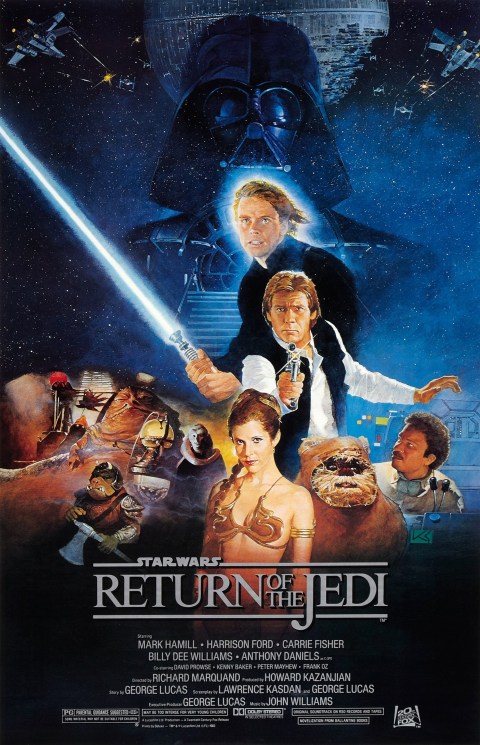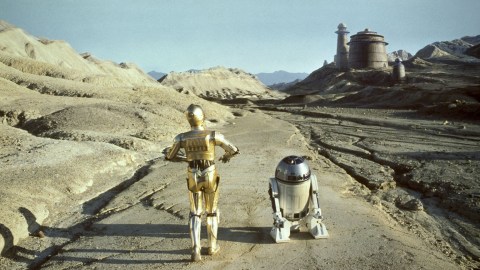17. 4. – 19. 4. 2026
Star Wars: Episode VI - Return of the Jedi

 Original title: Star Wars: Episode VI - Return of the Jedi
Original title: Star Wars: Episode VI - Return of the JediDirector: Richard Marquand
Production: 1983, USA
Length: 131 min.
Screened:
KRRR! 2013: 70mm 2.2:1, Colours intact, MG Dolby, Spoken language: English, Subtitles: CzechAnnotation for KRRR! 2013
How important is it to introduce a cinematic legend called Star Wars? How much sense is there in complaining that it is somewhat uncomfortable to start with the final installment of the original Star Wars trilogy? How justified is it to assume that some viewers may not have seen the previous installments A New Hope and The Empire Strikes Back, and will therefore probably be somewhat confused when watching Return of the Jedi? In all cases, the answer is that it certainly is, because introducing Star Wars is somehow necessary in the film's annotation, starting with the third installment can be considered somewhat unconventional in the case of a story that directly follows an interrupted flow of events, and viewers unfamiliar with Star Wars (strangely enough) do exist.
Star Wars was made by the then rather independent and experimental director George Lucas in 1977, and in this case it was also an experiment with various pop culture traditions (film, comic, literary and more generally genre), which were connected based on the model of the development of a mythical hero described in the book A Thousand Faces of the Hero by Joseph Campbell. The modern myth working with motifs associated today more with fantasy (wizards, knights, princesses, magic, rebels) was connected with science fiction props (spaceships, laser weapons, travel between planets), which was achieved with the help of completely unprecedented trick techniques at that time.
The following part The Empire Strikes Back, however, surprisingly questioned the victory of the protagonists and the abilities of the main character, showed the fight against galactic evil as a much longer and more tiring process and significantly mixed up the cards dealt regarding the past of some characters. It ended with the victory of evil, the sympathetic adventurer Han Solo ended up in the hands of the villains and the depressed central hero Luke Skywalker lost his father (who turned out to be the dark Lord Vader himself)… well, his hand. And now comes the third part of Return of the Jedi, which we can look forward to screening on the big screen in the Mír 70 cinema in Krnov.
And with Return of the Jedi comes another change in approach and the structure of the narrative itself, which, unlike the all-complicating Empire, is aimed primarily at successfully resolving all the plots and successfully tying the individual lines into a successful climax. The strangest thing is the split into two almost independently functioning films, the first of which, after a considerable time jump, continues the state of affairs at the end of the previous film and the second concludes all the unresolved motifs of both previous adventures. What is particularly clever is the use of the first half of the film as a substitute for the exposition of the second half, which can now throw itself headlong into the final battle with the evil Empire.
Moreover, the film abandons the previous genre fusion of fantasy, science fiction and western, and instead prefers to incorporate the expressive means of a war film, which also changes the way the action is filmed. Suddenly, it no longer works with the formula of man-to-man shooting, but with hiding, precise tactics and cunning tricks. The highlight, however, is the almost intimate sequence in front of the Emperor's throne, where the final confrontation between father, son and pure evil occurs, during which the boundaries between good and evil suddenly blur, and the hero has to fight the most difficult battle not only with his enemies, but above all with himself.
Whatever you think about the new Star Wars trilogy, the original trilogy simply represents an important part of film history. And not only because of the revolutionary trick procedures and the undeniable influence on the transformation of the promotional strategies of the Hollywood system. In addition to them, it is still fascinating to this day, especially because of the bold leaps from part to part, when each time it partially abandons the formulas tested by monumental audience success and tries something different, which shifts the perspective of the perception of the fictional world and its heroes a little somewhere else and turns the originally simple genre figures into more complex characters with more complex motivations.
And so, even though you already know well how it will turn out with all of them, you still worry about them every time... In other words, the tricks are getting old (although Lucas is still trying to "improve" them and in Krnov you can look forward to the original version without the supplied digital nerds and without Hayden Christensen), but the story is still just as captivating after three decades.